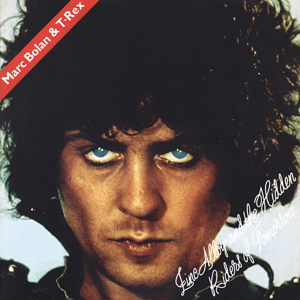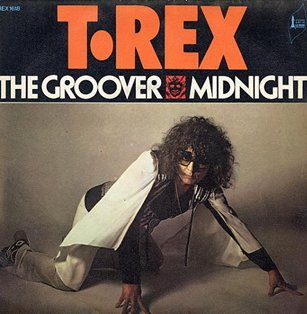
Marc Bolan was an English guitarist, singer-songwriter and poet. He was a pioneer of the glam rock movement in the early 1970s with his band T. Rex. Bolan strongly influenced artists of many genres, including glam rock, punk, post-punk, new wave, indie rock, Britpop and alternative rock. He was posthumously inducted into the Rock and Roll Hall of Fame in 2020 as a member of T. Rex.

Regal Zonophone Records was a British record label formed in 1932, through a merger of the Regal and Zonophone labels. This followed the merger of those labels' respective parent companies – the Columbia Graphophone Company and the Gramophone Company – to form EMI. At the merger, those records from the Regal Records catalogue were prefixed 'MR' and those from the Zonophone Records catalogue were prefixed 'T'. Record releases after the merger continued using only the 'MR' prefix.

Anthony Edward Visconti is an American record producer, musician and singer. Since the late 1960s, he has worked with an array of performers. His first hit single was T. Rex's "Ride a White Swan" in 1970, the first of many hits in collaboration with Marc Bolan. Visconti's lengthiest involvement was with David Bowie: intermittently from the production and arrangement of Bowie's 1968 single "In the Heat of the Morning" / "London Bye Ta-Ta" to his final album Blackstar in 2016, Visconti produced and occasionally performed on many of Bowie's albums. Visconti's work on Blackstar was awarded the Grammy Award for Best Engineered Album, Non-Classical and his production of Angelique Kidjo's Djin Djin received the Grammy Award for Best Contemporary World Music Album.

Steve Peregrin Took was an English musician and songwriter, best known for his membership of the duo Tyrannosaurus Rex with Marc Bolan. After breaking with Bolan, he concentrated on his own singer-songwriting activities, either as a solo artist or as a frontman for several bands.

Electric Warrior is the second studio album by English rock band T. Rex, released on 24 September 1971 and their sixth since their 1968 debut as Tyrannosaurus Rex. The album marked a turning point in the band's style, moving away from the folk-oriented sound of the group's previous albums and pioneering a more flamboyant, pop-friendly glam rock style.

The Slider is the seventh studio album by English rock band T. Rex, and the third since abbreviating their name from Tyrannosaurus Rex. It was released on 21 July 1972 by record labels EMI and Reprise. Two number-one singles, "Telegram Sam" and "Metal Guru", were released to promote the album. Issued at the height of the band's popularity, The Slider received acclaim from critics, reaching number 4 in the UK Albums Chart and number 17 in the US.

Futuristic Dragon is the eleventh studio album by English rock band T. Rex, released worldwide on 30 January 1976 by EMI Records bar North America. The album was preceded by two successful singles that went into the UK chart, "New York City" and "Dreamy Lady". The album saw Marc Bolan continuing to experiment, blending rock with soul music and disco elements on certain tracks.

A Beard of Stars is the fourth studio album by English psychedelic folk band Tyrannosaurus Rex, and their last before changing their name to T. Rex. It was released in March 1970 by record label Regal Zonophone.

Unicorn is the third studio album by English psychedelic folk band Tyrannosaurus Rex. It was released on 16 May 1969 by record labels Regal Zonophone and Blue Thumb, and was the last Tyrannosaurus Rex album to feature Steve Peregrin Took.

Prophets, Seers & Sages: The Angels of the Ages is the second studio album by English psychedelic folk band Tyrannosaurus Rex. It was released on 1 November 1968 by record label Regal Zonophone.

T. Rex is a 1970 album by Marc Bolan's band T. Rex, the first under that name and the fifth since their debut as Tyrannosaurus Rex in 1968. It was released on 18 December by record labels Fly and Reprise. The album continued the shift begun by its predecessor from the band's previous folk style to a minimal rock sound, with an even balance of electric and acoustic material.

Tanx is a 1973 album by rock band T. Rex, the eighth since their debut as Tyrannosaurus Rex in 1968, and the fourth under the moniker T. Rex. It was released on 16 March by record label EMI. Tanx was a musical departure from previous works: still containing tracks in the vein of The Slider, singer and songwriter Marc Bolan showed his interest for soul music, funk and gospel. Female backing singers appeared on a few tracks. New instruments such as mellotron were used, played by producer Tony Visconti, allowing the T. Rex sound to evolve.

"Ride a White Swan" is a song by English band T. Rex. It was released as a stand-alone single on 9 October 1970 by record label Fly, and was the first single credited under the band's new, shorter name. Like all of the band's songs, it was written by the group's singer, guitarist and founder Marc Bolan. The song was included on the US version of the 1970 album, T. Rex.

Bolan's Zip Gun is the tenth studio album by English rock band T. Rex, released on February 1975 by record label EMI.

Bolan Boogie is a compilation album by the English glam rock band T. Rex. After Marc Bolan had left Fly Records to form his own label distributed through EMI/T. Rex Wax Co, his former label released this compilation in 1972 with recent single A- and B-sides recorded in 1970 and 1971, many of which had not appeared on previous albums. Also included are album tracks from Tyrannosaurus Rex's Unicorn (1969), A Beard of Stars (1970) and T. Rex's T. Rex (1970).

Zinc Alloy and the Hidden Riders of Tomorrow is an album by English rock band T. Rex, the ninth since Tyrannosaurus Rex's debut LP. It was released in March 1974 on the T.Rex record label, distributed by EMI. It was the first and only album to be released under the moniker "Marc Bolan & T. Rex".

Fly Records is a British independent record label, established in 1970 by the independent music publisher David Platz, and initially managed by Malcolm Jones from the offices of Essex Music in London.

T. Rex were an English rock band formed in London in 1967 by singer-songwriter and guitarist Marc Bolan, who was their leader, frontman and only consistent member. Though initially associated with the psychedelic folk genre, Bolan began to change the band's style towards electric rock in 1969, and shortened their name to T. Rex the following year. This development culminated in 1970 with their first significant hit single "Ride a White Swan", and the group soon became pioneers of the glam rock movement.

"The Groover" is a 1973 single by the British glam rock band T. Rex. Neither the track nor its B-side are taken from an album. However, they are often added as bonus material on re-releases of the 1974 album Zinc Alloy and the Hidden Riders of Tomorrow.
"King of the Rumbling Spires" is a single by Tyrannosaurus Rex, released in July 1969. It featured the duo of Marc Bolan and Steve Peregrine Took and was written by Bolan. It was a minor chart hit, the first by the group to contain electric guitar instead of acoustic, and was Took's last appearance with the duo on record.



















